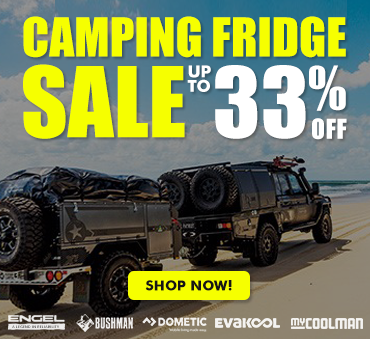There's nothing like heading off on a long road trip knowing you will still be able to get hot water, wherever you end up. Whether you want to indulge in the luxury of a steamy shower at the end of a long day exploring, or you want to clean your dishes in hot soapy water, a caravan hot water system is a vital part of your set-up.
These days, there is a huge variety of caravan hot water systems on offer, so you can easily add a new system or upgrade your existing system without a fuss. Gas, electric, diesel, instant heaters, portable, slimline and more - the hardest part is deciding which one to choose!
In this guide, we help you weigh up the pros and cons to work out the best caravan hot water system for your adventures.
Understanding Caravan Hot Water Fundamentals
Think of your caravan hot water system as a mini version of what you might have at home, but designed to be more compact and efficient for life on the road. While the goal is the same – to heat water – the way it's achieved and the specific requirements are a little different.
Core technology principles and terminology explained
At its heart, a caravan hot water system needs a heat source and a way to transfer that heat to your water. Here's a quick rundown of some key terms you might come across:
-
Heat Exchanger: This is the component where the heat from the gas burner, electric element, or diesel burner transfers to the water without the two actually mixing. Think of it like a metal barrier that gets hot and warms the water around it.
-
Storage Tank: Some systems have a tank that holds a certain amount of hot water ready for use. Once that hot water is used up, the system needs time to heat more.
-
Instantaneous (Tankless) Heater: These systems heat water on demand as it flows through the unit. You get hot water almost instantly, but they require a good flow rate and often more power while in use.
-
BTU (British Thermal Unit) or Kilowatts (kW): These are measurements of the heating power of the system. A higher number generally means faster heating.
-
Anode Rod: Often found in storage tank systems, this sacrificial rod is designed to corrode instead of the tank itself, extending the lifespan of the unit.
-
Thermostat: This regulates the temperature of the water, preventing it from getting too hot.
-
Pressure Relief Valve: A safety device that releases pressure if it builds up too high in the system.
Australian Compliance Requirements
Now, this is important for your safety and peace of mind. In Australia, caravan hot water systems, especially gas-powered ones, need to meet strict Australian Standards. Look for certifications and compliance labels. These standards cover things like safety features, installation requirements, and gas emissions. It's crucial to have a has system installed by a certified professional to ensure it is compliant with these regulations and avoid potential hazards. Don't skimp on this – it's not worth the risk.
Key Considerations
When choosing a system, you'll need to think about a few practical things:
-
Water Pressure: Caravan water pumps often have lower pressure than mains water. Check the minimum and maximum water pressure requirements of the hot water system to ensure it will work well with your setup.
-
Flow Rates: This refers to how much hot water the system can deliver per minute. For a decent shower, you'll need a certain flow rate. Instantaneous systems are particularly sensitive to flow rates.
-
Temperature Control: How easily and accurately can you adjust the water temperature? Some systems have simple settings, while others offer more precise control. Consider what level of comfort you're after.
Differing From Home Systems
While the basic principle of heating water is the same, caravan hot water systems are designed with the unique challenges and limitations of mobile living in mind:
-
Size and Weight: Caravan systems need to be compact and lightweight to fit within the limited space and weight restrictions of a caravan or RV.
-
Power Source Flexibility: Unlike homes that are typically connected to mains electricity and gas, caravans need to be able to operate off-grid, often relying on gas bottles, batteries, or even solar.
-
Durability and Vibration Resistance: Caravan systems need to withstand the bumps and vibrations of travel.
-
Water Usage Efficiency: Water is a precious resource when you're on the road, so caravan systems are often designed to be more water-efficient.
-
Winterisation: In colder climates, caravan systems often require specific procedures to prevent freezing and damage during storage.
Types of Hot Water Systems
Caravan hot water systems can run on electricity, gas or both. This gives you the ultimate flexibility of connecting to mains power when available or using gas when free camping.
Gas Systems
Gas hot water systems run on LPG (propane or butane) and are a popular choice for caravans in Australia, particularly for those who do a lot of free camping. They generally offer quick heating and good capacity.
Storage Tank Option:
These systems heat a certain amount of water in a tank (usually around 10-22 litres). Once heated, the water stays hot until used. They're generally cheaper to buy initially but have a limited supply of hot water at any one time.
Instantaneous Options:
These heat water as it flows through the unit, providing a continuous supply of hot water. They're generally more expensive upfront and require a good water flow and gas supply but can be more efficient in the long run as they're not constantly heating a tank.
For off-grid adventurers gas or diesel systems are the primary choices as they don't rely heavily on mains electricity. Solar can supplement electric systems, but it's not a standalone solution for heating large amounts of water.
Electric Systems
Electric hot water systems are a great option when you have access to mains power or a generator. They are quieter than gas systems and easier to install. Most electric systems use a storage tank, typically holding between 5 to 10 litres of water. They also have a heating element, usually running on 240V and around 1200W.
Electric hot water systems require a lot of power, especially when heating water. This makes them ideal for use at caravan parks or when running a generator. However, they can quickly drain batteries if used frequently off-grid. These systems are generally efficient at converting electricity into heat, but their overall performance depends on how well the tank is insulated. The recovery rate, or the time it takes to reheat water after use, is also an important factor to consider. Installation is usually simpler than gas systems, as there is no need for gas lines or ventilation. However, it is important to ensure that your caravan’s electrical system can handle the power load before installation.
Combination Gas/Electric Hot Water Systems
Combination gas and electric hot water systems provide flexibility, allowing you to choose the best power source based on your location and energy availability. One of the biggest advantages of these systems is their dual-fuel capability. You can use gas when free camping and switch to electric when connected to mains power, helping to save gas and battery life.
Most models come with an easy-to-use switch that lets you choose between gas and electric operation. Some even feature automatic switching for added convenience. These systems are ideal for travellers who split their time between caravan parks and off-grid camping. Popular brands like Suburban and Truma offer combination models, so it’s worth comparing tank sizes, heating times, and power usage in electric mode before choosing the right one.
For full time travellers a combination gas/electric storage tank system offers the flexibility of using gas when free camping and electric when on hook-up. Alternatively, a high-quality instantaneous gas system can provide endless hot water if you have ample gas supply. Diesel systems are also worth considering for long-term travellers in diesel-powered RVs.
Diesel Hot Water Systems
Diesel hot water systems are becoming more popular, especially for larger RVs that already run on diesel. These systems use your vehicle’s fuel supply, eliminating the need for separate gas bottles.They work by burning diesel to heat water, much like a small diesel furnace. While they can be highly efficient, they do have a higher upfront cost. Fuel consumption is usually low, making them more efficient than running a generator for electric hot water. However, if you're travelling long distances, it’s important to factor in fuel usage.
Diesel hot water systems are best suited for diesel-powered RVs, as this avoids the need to carry multiple fuel types. However, they can be a bit noisy when running, and proper exhaust routing is necessary to ensure safe operation.
Portable Hot Water Systems
Portable hot water systems are an affordable and flexible choice, perfect for short trips or those who prefer a non-permanent setup.These systems usually need a gas bottle and a water source, such as a jerrycan or hose. They often have lower water flow rates and may require manual ignition. You can use water from different sources, but it's best to use a filter to prevent sediment from clogging the system.
Portable systems are ideal for washing dishes, taking quick showers, or camping in places without a built-in hot water supply. They are compact, easy to store, and simple to transport when not in use, making them a convenient option for travelers.
For weekend warriors a portable system could suffice for shorter trips and less frequent use.
Australian-Specific Considerations
Australia's diverse climate and unique conditions present specific challenges and opportunities when it comes to caravan hot water systems.
Regional Climate Adaptations
-
Tropical North solutions: In hot and humid conditions, rapid heating might not be a priority. Focus on systems with good insulation to prevent the water from getting too hot and consider the ventilation around the unit to dissipate heat. Corrosion resistance is also important due to the humidity.
-
Desert/Outback considerations: Water conservation is paramount in arid environments. Instantaneous systems might be preferable as they only heat water when needed. Dust and sand ingress can be an issue, so look for systems with good sealing and consider protective covers. LPG availability in remote areas needs careful planning.
-
Alpine region preparations: Freezing temperatures are a concern in winter. Systems must be easily drainable and well-insulated to prevent damage. Consider systems with built-in frost protection or be diligent with winterizing procedures.
-
Coastal environment protection: Salt air can be corrosive. Opt for systems with stainless steel components or protective coatings to prolong their lifespan. Ensure proper ventilation to avoid salt buildup around the unit.
Energy Availability
Access to different energy sources can vary greatly depending on your location in Australia.
-
LPG accessibility across remote areas: While LPG is widely available, getting refills in very remote areas can be challenging. Plan your gas consumption carefully and consider carrying a spare bottle if you're heading far off the beaten track. Diesel might be a more readily available fuel source in some remote areas.
-
Solar potential by region: Australia has abundant sunshine, making solar a viable option for supplementing power. Consider how solar can contribute to running electric hot water systems (directly or by charging batteries). The size of your solar array and battery bank will determine how much you can rely on solar.
-
Power reliability at different campsite types: Power availability varies significantly. Caravan parks usually offer reliable 240V hook-ups, while free camps might have no power at all. Plan your hot water usage based on where you'll be staying. Combination gas/electric systems offer the most flexibility in this regard.
Leading Brands In Australia
Truma Systems
Truma is a well-respected European brand known for its quality and innovation in caravan appliances. Their systems are generally at the higher end of the price spectrum but offer advanced features and reliability.
-
Truma AquaGo: This is a popular instantaneous gas system prized for its compact design and ability to deliver continuous hot water at a consistent temperature. It boasts features like automatic temperature control and a self-descaling function. However, it requires a good gas supply and water pressure to operate optimally.
-
Truma UltraRapid: This is a storage-type system that offers the flexibility of both gas and electric heating. It's known for its rapid gas heating capability, hence the name. While the electric heating is slower, the dual-fuel option makes it versatile. It's relatively lightweight for a storage system.
Suburban Systems
Suburban is a more budget-friendly option, particularly their gas/electric storage tank systems. They are a common sight in Australian caravans and are known for their robustness and relatively simple operation.
-
Suburban SW6DE: This is a widely used model in Australia. It offers a large 22.6-litre capacity, making it suitable for families or those who like longer showers. It has both gas and electric heating elements. While the electric heating is slower than Truma's, it's a reliable workhorse. Suburban systems are generally easier to maintain and parts are readily available in Australia.
Camec Systems (Digital Instant)
Camec is an Australian brand that has been growing in popularity, particularly with their instantaneous gas hot water systems. They offer a more affordable alternative to Truma while still providing the convenience of continuous hot water.
-
Camec Digital Instant: This system is known for its compact and lightweight design, making it suitable for smaller caravans. The digital temperature control allows for precise adjustments. As a newer player in the market compared to Truma and Suburban, it's worth considering user reviews and long-term reliability reports. However, it presents a competitive option in the instantaneous category.
Installation & Setup
Getting your caravan hot water system installed properly is paramount. Here's what you need to know:
Professional vs. DIY Installation
Professional Installation: Hiring a qualified professional, especially for gas systems, is generally recommended. They have the expertise to ensure everything is installed safely and according to regulations. This might cost more upfront but can save you headaches and potential hazards down the line.
DIY Installation: While some electrically powered systems might seem straightforward enough for DIY, you need to be confident in your abilities and understand the potential risks. Always follow the manufacturer's instructions meticulously. Never attempt to install a gas hot water system yourself unless you are a licensed gas fitter.
In Australia, any work involving gas systems in caravans must be carried out by a licensed gas fitter. This is a legal requirement to ensure safety and compliance with Australian Standards. Failure to comply can result in fines and void your insurance.
Safety Considerations
Safety should be your top priority during installation.
-
Gas Systems: Incorrectly installed gas systems can lead to leaks, explosions, and carbon monoxide poisoning. This is why professional installation is non-negotiable. Ensure proper ventilation is in place as per the manufacturer's guidelines.
-
Electric Systems: Ensure the electrical connections are done correctly and are rated for the load. Incorrect wiring can lead to fires or electrocution. If you're unsure, get a qualified electrician to handle the wiring.
-
General: Always disconnect power sources (battery and mains if applicable) before starting any installation. Wear appropriate safety gear.
Space & Mounting Requirements
Careful planning of the system's location is essential.
-
Dimension specifications: Ensure the chosen location can accommodate the physical dimensions of the hot water system, including any necessary clearances around it.
-
Ventilation clearances: Gas systems require specific ventilation clearances to allow for proper combustion and venting of exhaust fumes. Electric systems also benefit from some airflow to prevent overheating. Refer to the manufacturer's instructions for exact requirements.
-
Access for servicing: Choose a location that allows for easy access to the unit for future maintenance, servicing, and winterising.
Connection Requirements
Getting the plumbing and electrical connections right is crucial.
-
Plumbing specifications: Use the correct type and size of plumbing fittings and hoses as specified by the manufacturer. Ensure all connections are watertight to prevent leaks. Consider the water pressure requirements of the system and your caravan's water pump.
-
Electrical connections: For electric or combination systems, use appropriately rated wiring and fuses. If connecting to 240V, ensure it's done safely and complies with electrical standards. For 12V connections (for controls or some heating elements), ensure correct polarity and fuse protection.
-
Gas fitting standards: For gas systems, a licensed gas fitter will handle all gas line connections using approved materials and techniques, adhering to Australian Standards. They will also perform gas leak tests after installation.
Step-by-Step Setup Guide
While professional installation is often needed, here's a general idea of the setup process you might encounter or need to be aware of:
-
Mounting the Unit: Securely mount the hot water system in the chosen location according to the manufacturer's instructions, ensuring it's level and stable.
-
Plumbing Connections: Connect the cold water inlet and hot water outlet using appropriate fittings and hoses. Ensure any pressure relief valves are installed correctly.
-
Electrical Connections (if applicable): Connect the electrical wiring according to the wiring diagram provided. Ensure proper grounding and fuse protection.
-
Gas Connections (Professional Only): If applicable a licensed gas fitter will connect the gas supply line using approved fittings and test for leaks.
-
Ventilation (for Gas): Ensure the correct ventilation is in place, including any necessary flues or vents.
-
Initial filling procedures: Once all connections are made and checked (especially gas by a professional), you can begin filling the system with water according to the manufacturer's instructions. This usually involves opening taps to allow air to escape as the tank fills.
-
System testing: After filling, test the hot water system according to the manufacturer's guidelines. For gas systems, the gas fitter will perform safety checks. For electric systems, test the heating function.
Caravan Hot Water Systems FAQs
Q: How much gas does a caravan hot water system use?
A: Gas usage varies depending on the system type and how often you use it. Storage tank systems use gas to heat the water initially and then occasionally to maintain the temperature. Instantaneous systems only use gas when the hot water tap is turned on. Generally, expect to use around 0.1 to 0.2 kg of LPG per hour when the burner is operating.
Q: Can I run a 240V hot water system off my caravan's inverter?
A: While possible, it's generally not recommended for extended periods. 240V hot water systems draw a significant amount of power (typically 1200-1500W), which will quickly drain your batteries even with a large inverter. It's more efficient to use gas or a generator for heating water off-grid.
Q: Do I need a special water pump for a caravan hot water system?
A: Most caravan hot water systems are designed to work with standard 12V caravan water pumps. However, it's essential to check the minimum water pressure requirements of the hot water system and ensure your pump can meet them.
Q: How long does hot water stay hot in a storage tank?
A: This depends on the tank's insulation and the ambient temperature. Generally, you can expect hot water to stay warm for several hours, but it will gradually cool down. Some higher-end systems have better insulation and will retain heat for longer.
Q: Is it safe to travel with a full hot water tank?
A: Yes, caravan hot water systems are designed to be travelled with a full tank. However, be mindful of the added weight and ensure the system is securely mounted.
Final Thoughts
Remember to carefully weigh the pros and cons of each type – gas for off-grid freedom, electric for campsite convenience, diesel for seamless integration with your RV's fuel, and portable options for flexibility. Consider the Australian climate and water conditions, and don't underestimate the importance of proper installation and maintenance.
Investing in a quality caravan hot water system is an investment in your travel experience. It's about more than just hot showers; it's about the little luxuries that make life on the road feel more like home. So, take your time, do your research, and choose wisely. With the right system in place, you'll be well-equipped to tackle any adventure Australia throws your way, knowing a warm shower is always within reach. Happy travels, and may your water always be hot!
Still having trouble selecting the Caravan Hot Water System for your needs? Give us a call on 1300 400 122!
-
DISCLAIMER* Please note, this advice is general in nature and we strongly recommend consulting the product manual and where relevant, a professional installer.











